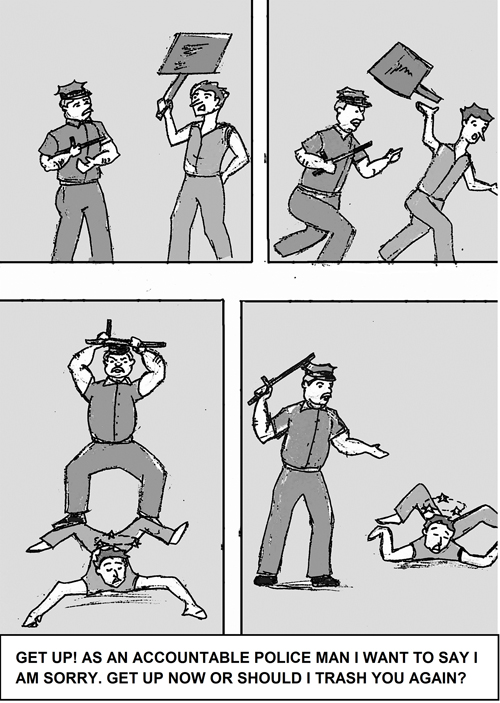
Police in today’s society have quite a bit of power with very little accountability, and we have known for decades that such authority inevitably leads to abuse.
As many psychology majors know, a famous study called the Stanford Prison Experiment shed light on the depths of cruelty and depravity normal individuals can sink to in certain situations.
The experiment went down more than 40 years ago, in 1971, and was led by Dr. Philip Zimbardo, a rather off-putting but engaging man who seems to perpetually sport the same circle beard.
With the promise of a little participation money, a group of young men were told that they were either going to be prisoners or prison wardens and then placed in a jail environment to see what would happen.
Things hit the fan. Despite being scheduled to last two weeks, the experiment abruptly ended after only six days. The reason? The participants had become so distorted by their fake roles that some started to have mental breakdowns and outbreaks of sadism, and some even went on good-old hunger strikes.
These rather unfortunate responses were the result of some very unfortunate roles the individuals took on during the study. The prisoners quickly became sick of being referred to only by a number and treated less than sweetly by their fellow participants acting as guards.
The guards stripped the prisoners naked, put bags over their heads and made them do exercises to humiliate them. Later, they started interrupting the prisoners’ sleep and harassing them emotionally.
It’s pretty important to emphasize the fact that such degeneracy occurred after only six days, and that the individuals involved were all screened to make sure that they weren’t, you know, completely insane. The fact that such abuse can happen so quickly in a group of normal individuals who just answered an advertisement in a local paper is startling.
So what does that mean for the modern police force? It means that the power of situation and the illusion of authority can lead to incredible brutality in a very short amount of time. Individuals who are put in that position of power on a daily basis must be held accountable. We have to make sure that the inclination to be a complete jackass is stomped out frequently.
There are instances of police brutality all the time. Portland developed the reputation of being a “shoot first, ask questions never” kind of city.
There was William Kyle Monroe, for example, a man diagnosed with bipolar disorder who was crippled by a police officer in 2011 when the cop decided Monroe was just acting too weird and shot him. Oh, and the incident sparked a lawsuit that cost Portland $2.3 million dollars.
Jason Cox, who was lucky enough to get security camera footage of himself being beaten, is currently suing Portland for more than $500,000. The video shows police officers pushing what looks like a very calm Cox to the ground, using a taser on him four times and punching him repeatedly in the face.
Of course, it’s not just our city that faces problems with violent police officers. Seattle was a little embarrassed back in 2010 when an officer named Ian P. Walsh decided to punch a 17-year-old right in the face. Again, the young woman was lucky enough to get the incident on camera.
There’s not necessarily a clear solution to this problem, but it is very apparent that the problem exists. I would also argue that it is our responsibility as citizens as well as the responsibility of the government to make sure that we protect police officers from themselves, especially given the knowledge that an average person can fall victim to his own depths of vindictiveness when in a position of power.
We set ourselves up for failure by not monitoring our police. There needs to be a better system by which impartial groups can monitor police and keep them honest and decent.

